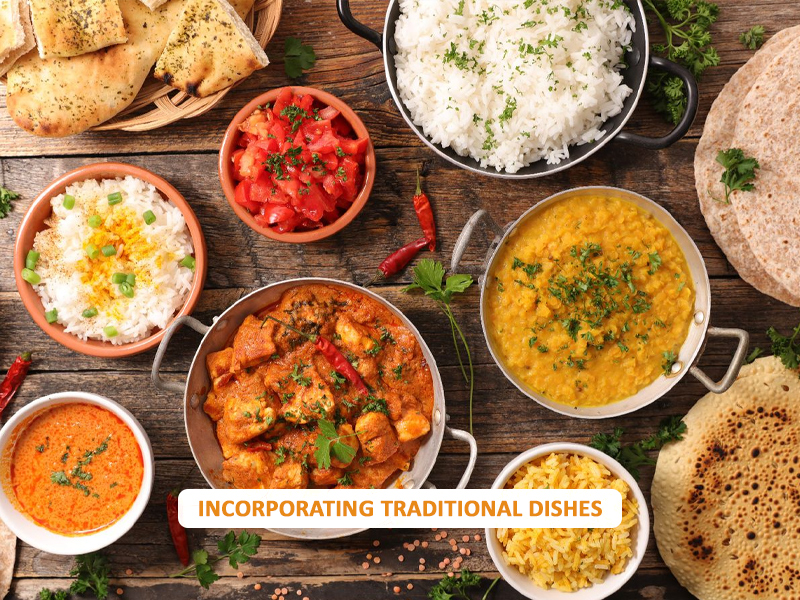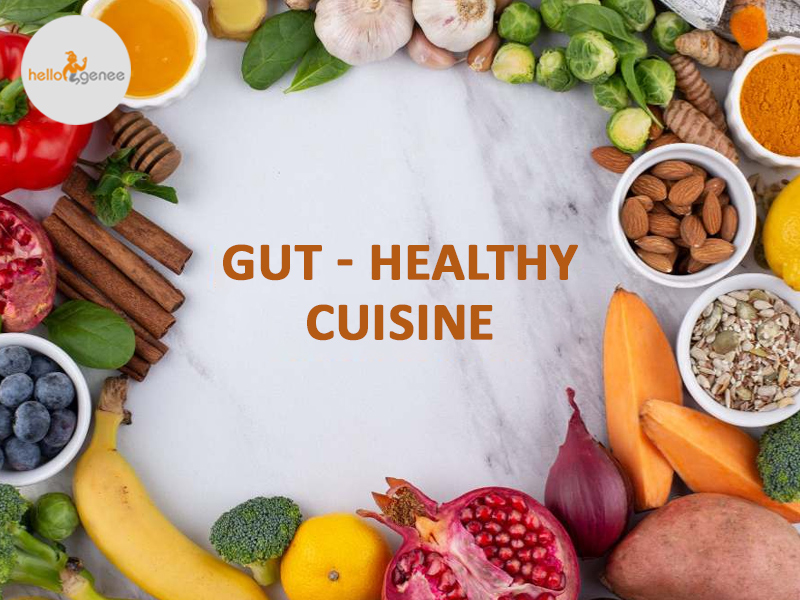Gut-Healthy Cuisine
"You are what you eat."
Welcome to our blog
about gut-healthy cuisine! If you're interested in learning about managing your
digestive wellness through diet, you've come to the right place.
We have all struggled with gut issues, so we've made it my mission to research the latest on gut health programs, the most gut-healthy foods to eat regularly, and easy lifestyle habits like exercise that can keep your digestive system running smoothly.
In this blog, We plan to provide you with an informative guide on maintaining good gut health naturally. We'll break down the often misunderstood relationship between what we put in our mouths and how our bellies feel. We'll share practical tips and recipes centered around gut-healthy foods from our trial-and-error journey.
Before we start, We want to acknowledge that not all advice works for everyone. While extensive research has compiled the following list of often recommended foods to support a happy gut, always check with your doctor, as individual needs may vary. We aim to raise awareness on this important topic and hopefully spark new ideas you can discuss with your healthcare provider.
We want to entertain and
educate as we explore different elements that can promote digestive wellness,
like dietary changes, lifestyle habits, and more. Please feel free to share
your experiences in the comments. An open discussion will make this gut-health
program truly helpful for all. Now, let's learn more about cultivating a
balanced belly together!
Staying on Track with
Gut-Healthy Meal Plans

Creating weekly meal plans centered around gut-healthy foods is one of the most effective ways to improve your digestive wellness. Preparing breakfast, lunch, and dinner recipes in advance each Sunday can help avoid gut-irritating triggers and fast food temptations throughout the week. Some easy gut-healthy meals to plan include homemade bone broth, grass-fed beef or salmon stir-fries over vegetable noodles, and protein smoothies with nut butter.
You can even find
ready-made gut-healthy meal delivery programs and apps like HealthyFyMe to make
planning a breeze. Checking in with a nutritionist can also help tailor a diet
to your gut health goals and needs. You'll be well on your way to cultivating
balanced belly days with the proper meals on rotation.
Supporting Your System
with Lifestyle Habits

While diet plays a huge role in digestive wellness, maintaining an overall lifestyle conducive to gut health is equally important. Things like managing stress levels through yoga, meditation, or simply carving out relaxation time are vital, as high cortisol impacts our microbiomes. Additionally, implementing moderate exercise a few times weekly supports gut motility. Even a 30-minute walk can make a difference. If you're looking for competitive fun, explore mobile esports games in India or join local gaming tournaments in-person or virtually through quality esports tournament apps and websites.
Finding enjoyment
through non-sedentary activities is vital while allowing downtime to let your
belly fully digest and recover between meals. Listening to your body will serve
your gut well in the long run.
Plant-Based
Powerhouses to Incorporate
Plants are packed with
prebiotics, fiber, and antioxidants to feed the good bacteria in our bellies.
Incorporate more:
● Fermented foods like kimchi, kombucha, kefir and
yogurt
● Berries (I love a smoothie with banana, spinach
and blueberries)
● Sprouted legumes like edamame, lentils and
chickpeas
● Leafy greens like spinach, kale and arugula
● Cruciferous veggies like broccoli, cauliflower
and Brussels sprouts
● Ginger and turmeric for their anti-inflammatory
properties
● Prebiotic foods like asparagus, leeks, garlic and
onions
Lean
Proteins for Digestive Support
Opt for high-quality, easily digestible animal proteins 1-2 times daily:
● Grass-fed or pasture-raised beef and bison
● Wild-caught fish like salmon, sardines and trout
● Free-range organic poultry
● Eggs, especially from pastured hens
● Plant-based options like tofu, tempeh, edamame
and lentils
To slow digestion, pair proteins with healthy fats and fiber-rich carbs at each meal. Some favorite combos include salmon over quinoa and sweet potato or turkey chili served with avocado.
Traditional
Indian Spices for Digestion
Indian cuisine uses warming spices that support gut health, like turmeric, cumin, coriander, fennel, and fenugreek. These spices are powerful gut healers due to their anti-inflammatory and prebiotic properties. Incorporating them regularly is one of the best ways to improve gut health naturally and maintain a happy digestive system. Mix a teaspoon of your favorite blend into warm water or milk as a daily 'golden milk'. Consuming gut-friendly spices is essential to any gut health program focused on eating the most gut-healthy foods.
Indian cuisine makes excellent use of warming spices that support gut health:
● Turmeric - A potent anti-inflammatory and antioxidant. Try adding it to milk or using it in golden milk.
● Cumin - Eases digestion and bloating. Add to
dals, curries, or roast whole as tempering for lentils.
● Coriander - Rich in fiber, iron, and
antioxidants. Grate fresh leaves into soups and curries.
● Fennel - Helps reduce gas, bloating, and
constipation. Enjoy seeds after meals or use ground in flatbreads.
● Fenugreek - High in fiber and vitamins. Add seeds
to rice puddings or roast and grind to season dals.
● Garlic and ginger - Natural gut flora boosters.
Fry together as a tempering for any curry or stir fry.
Incorporating
Traditional Dishes

Indian cuisine lends itself to gut health when choosing balanced traditional dishes like dals, soups, vegetable curries, and whole grain parathas. Focusing meals around dishes high in fiber, prebiotics, and beneficial bacteria allows your digestive system to run smoothly. Select recipes centered on the gut-healthy foods list, avoiding refined flour or excess oil. Pairing fiber-rich Indian fare with regular exercise is a tasty way to support gut motility and help your body digest nutrients for ultimate digestive wellness.
Indian cuisine lends itself well to gut health when choosing balanced traditional dishes:
● Dals like moong, chana, or masoor are made of
fiber, minerals, and protein.
● Soups like rasam or kadi - Hydrating and easy to
digest when made with lentils or yogurt.
● Vegetable curries like saag or baigan are packed
with prebiotic veggies and complex carbs.
● Parathas are made with whole grains - More fiber
than white flour- and delicious filling options.
● Puddings like kheer or payasam - Soothing
milk-based desserts with gut-friendly grains or nuts.
● Fermented pickles (achar) in moderation -
Probiotic boost from ingredients like mangoes or limes.
To Sum Up
We hope this gut health program has inspired you to incorporate some of the most gut healthy foods into your weekly meals. Focusing on various plant-based powerhouses, lean proteins, Indian spices, and traditional dishes is a delicious way to support your digestive wellness naturally. While diet is vital to gut health, remember lifestyle factors that can improve your overall digestive environment.
Making time for relaxation through yoga or meditation, regular moderate exercise through walks or mobile esports games, and listening to your body are all essential ways to maintain good gut health. Reducing stress and keeping active will allow your digestive system to recover appropriately between meals.
By adopting many of
these gut-friendly dietary changes and lifestyle habits, you'll be on your way
to cultivating a happy, balanced gut. Always check in with your healthcare
provider, as individual needs may vary. Remember that Rome wasn't built in a
day—be patient and kind to yourself as you learn what foods and routines best
serve your unique gut health program. We hope the suggestions here inspire you
to support your digestive wellness through small daily steps. Nurturing gut
health should be an enjoyable journey of self-care.












Comments